Across the Earth’s northern hemisphere, many Western cultures celebrate the cooling year: fall with Halloween and Thanksgiving, the winter solstice with Christmas. The days grow shorter, the temperatures are falling, but we trust that longer days, spring and summer, will eventually return.
Return, that is, barring a nuclear winter, supervolcano eruptions, or visiting aliens constructing a Dyson shell between us and the sun. SF fans think about these things!
The following five SFF works explore worlds where spring and summer may well not return.
The Star Stealers by Edmond Hamilton (1929)
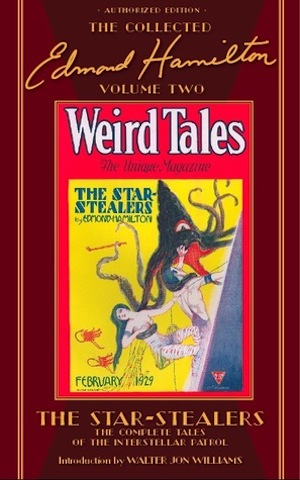
Humans are but one member race of the Federated Stars, a pan-species union of stellar nations. The Federated Stars operate an Interstellar Patrol, in which stalwart Ran Rarak is an officer. When a seemingly dead star seems set on dragging the Sun out of the galaxy, Ran and his crew investigate. The culprits? Malevolent aliens native to the dead star system, intent on appropriating our sun, regardless of the inconvenience this implies for humanity. Only the Patrol stands between the invaders and human doom!
In the aliens’ defense, they were not planning on letting us freeze. They wanted to smash the Sun’s planets into their dead star, which isn’t much better from our perspective, although the aliens thought it would be quite jolly. At least it would be quick.
Hamilton’s Interstellar Patrol series features alien species after alien species hoping to forestall impending doom in ways that would endanger the Federated Stars. Later SF series might have had their own Patrols offer the doomed aliens some way to survive without dooming other races. Not Hamilton! His Patrol never met a doomed alien civilization whose demise they were unwilling to hasten.
Have Space Suit—Will Travel by Robert A. Heinlein (1958)
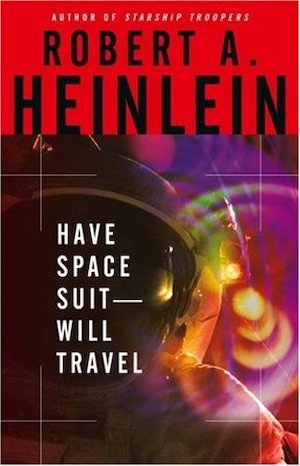
Having won second prize in a contest, Kip Russell wins not a trip to space, but a used space suit. Making the best of the situation, Kip refurbishes the suit, much as one might fix up an old jalopy. Kip’s resolute pluckiness first entangles him in an impending alien invasion from a nearby star system, then draws him (and by extension the human race) to the attention of that great civilization that dominates the Milky Way and Magellanic Clouds. The first is terrible but the second is potentially much worse: unless Kip can convince the Galactics that humanity is worth sparing, the pragmatic aliens will spare themselves possible future headaches by rotating the Earth into another universe… sans Sun. Icy doom will surely follow.
The Galactics resort to planetary genocide pretty casually, which makes me wonder just how many civilizations found themselves sunless immediately after first contact. Fortunately for humanity, the protagonist had the author on his side, so the solution the protagonist hits on (defiant yelling) turns out to be just the thing to convince the Galactics to spare us.
The Great Darkness (from Greg Stafford’s Glorantha)
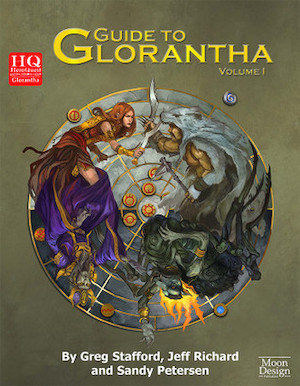
As detailed in various editions of the venerable tabletop roleplaying game RuneQuest (1978 onwards), the gods who rule the fantasy world Glorantha are a boisterous lot who are ebullient but imprudent. On occasion they have been known to inadvertently endanger the whole world. One such calamity is known as the Great Darkness, which ensued after the god Orlanth used newly invented Death to murder the sun god Yelm. Cue a sunless ice age, which ended only when Yelm was restored to life.
Being murdered and dispatched to the dark realms was certainly an inconvenience for Yelm. It was far more inconvenient for the trolls who lived in the dark realm, who were not equipped to deal with the unexpected appearance of a still luminous dead sun god in their midst.
One might expect that a fantasy world where the gods are physically verifiable reality wouldn’t have atheists. There are no atheists in Glorantha, but there are people who believe that while gods exist, they are not worthy of worship.
That seems sensible to me. Why worship entities who occasionally put the world at risk?
The World at the End of Time by Frederik Pohl (1991)
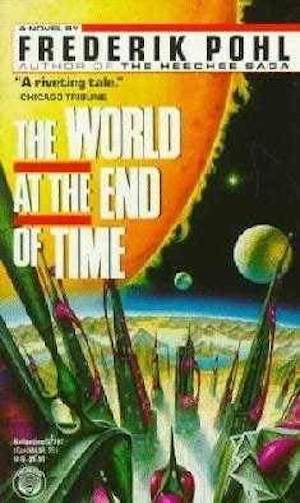
The good news for most humans is that they are not doomed to eternal darkness by the interstellar war between godlike star-dwellers. The bad news is that most of the human race is incinerated almost instantly as an insignificant side-effect of the dispute between Wan-To and the godlike alien’s offspring. Only previous attempts at human interstellar colonization preserves a tiny remnant of the human species and that, again thanks to Wan-To’s bold decisions, finds itself accelerated through time, ultimately trapped in a starless era. For the moment, one human civilization clings to life around a time-displaced brown dwarf. But only for the moment….
It is fair to say, “mistakes were made.” Readers looking for comfort reads may want to look elsewhere, as the recurring them in this Pohl novel is “And then things somehow became even worse.” And not always due to Wan-To and his children.
Mars Evacuees by Sophia McDougall (2014)
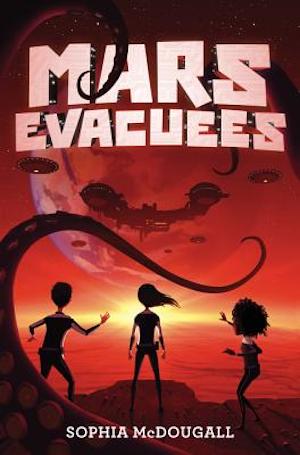
The alien Morrows saved humanity from unchecked global warming, in exchange for which they asked only for Earth’s coldest territories. These regions being too small for Morrow needs, the aliens proceeded to turn the dial on Earth’s climate way down. War ensued, one which the brave and resourceful humans have been losing at a steady pace. Humans are holding out on Mars. Protagonist and draftee Alice Dare is evacuated from Earth to Beagle Base on Mars. There her knowledge of the world will be greatly expanded, not least in the field of what it was that inspired the Morrow to flee their home system. Or perhaps “terrified the Morrow” would be more appropriate.
Among the questions addressed by the plot of this book: how quickly unattended students will go full Lord of the Flies if for some reason their adult minders were to vanish. The answer appears to be “much faster than you probably expect.” The speed at which the kids go feral raises questions about the value of their previous education.
***
Winter being the great enemy in many regions of the Earth, it’s no surprise there are any number of works in which winter is said to be coming, this time without subsequent respite. Feel free to enumerate the many examples I’ve overlooked in the comments, which are, as ever, below.
In the words of fanfiction author Musty181, four-time Hugo finalist, prolific book reviewer, and perennial Darwin Award nominee James Davis Nicoll “looks like a default mii with glasses.” His work has appeared in Interzone, Publishers Weekly and Romantic Times as well as on his own websites, James Nicoll Reviews (where he is assisted by editor Karen Lofstrom and web person Adrienne L. Travis) and the 2021 and 2022 Aurora Award finalist Young People Read Old SFF (where he is assisted by web person Adrienne L. Travis). His Patreon can be found here.










